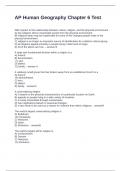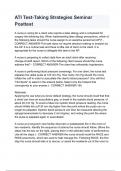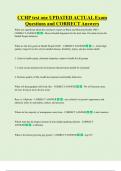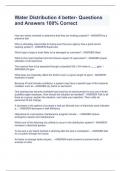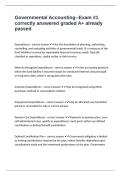compromises on the eastern front G to rearm in secret issue is resolved
Dawes &
Mistrust/scepticism increased with G's treaty with Stresemann had to get
Young Plan
Russia, the treaty of Rapallo 1922, since showed this balance right
WW1, ToV = economic
they were moving to the east
Stresemann's policy of recovery. Many
fulfilment succeeded Impacts G in German's
Army also sponsored paramilitary groups, 2 - Once the Being a good European
in persuading the Throughout the early years of Being a good German - a number of disliked that
even after the Freikorps had been young plan had meant fulfilling treaty of
allies to remove their Weimar, relations between doing what's best for G ways he was not
disbanded after the failed Kapp Putsch 1920 been agreed in versailles (policy of
occupation forces from Germany & the Western Allies regardless on the impact resisting the
1929, the fulfilment), improving
G in a step-by-step had been poor this has on others. Very demands of
So, this did not remaining allied trade links G was admitted to
approach (mainly cos nationalistic, RW approach the ToV
directly provide G forces were the LoN in 1926
Under command of General French were v Relations improve though
with a fully withdrawn from
Seeckt, the Reichswehr found reluctant) with the end to Pre-golden Good European vs
operational Air Zone 2 in 1929 Allied forces withdrawn from the His coalition gov
other ways around the limits on
and Zone 3 in hyperinflation, and the age foreign Good German
Force, or army the size of the army by enlisting Rhineland 5 years earlier fell through in
1930 Dawes Plan policy
with unlimited new recruits for short periods of 1 - After Dawes Plan 1925 Young P united nov 1923, but
supplies of Successes the radical right during the
intensive training, thereby creating & Locarno Pact 1925
modern weapons a large reserve of trained forces provided evidence of G Success = golden years he
etc BUT it did Removal of foreign forces Stresemann had got Failures was foreign
willingness to cooperate w/ How successful was Stresemann's foreign
ensure that G did from German soil was an the allied troops out minister
allies, occupation forces
not fall behind G was subject to the disarmament aim shared by all Germans, of G 5 years before Stresemann's FP? policy objectives
were withdrawn from Zone
other powers in clauses in the ToV and an regardless of party the ToV had said
1 of the Rhineland in 1926.
technological InterAllied Control Commission was Also withdrew the IMCC in Consistent aim of
developments established to ensure compliance same year Restore G to its FP during these
Germany's international position of 1924-28 (FP) An end to allied
great power years was to revise
military occupation
status, its pre the ToV
Treaties of Rapallo (1922) and Berlin (1926) with the USSR, allowed of the Rhineland
End of Allied occupation Locarno war empire
G to get around the disarmament clauses by building aircraft in the
Treaties due to Pact 1925
USSR (something which ToV said there couldn' t be) and similar
Extent of disarmament diplomacy
arrangements were made; submarines in Spain and tanks in Sweden
Relations with the Signed in Planned to do this through diplomatic means rather than
USSR Dec 1925 military (too weak economically and militarily to risk
Were both seen Other another war). Peaceful cooperation was essentially the
Significant as it improves as outcast achievements only way. Designed to reassure the allies of G's good
Although huge political differences, G 1926 - Stresemann proposed a security pact
stability of the economy nations, faith & thereby winning concessions from them
& USSR shared some similarities allowed to for European western frontiers
-another trading ally excluded from
which led G to see advantages in a join LoN (borders) and was held in October
the LoN
close working relationship with them Success for 1925 in the Swiss city of Locarno
Reactions - mixture in G, would be Stresemann - meant Diplomacy lead to a
Known as policy number of treaties
happy that they are going round the 1928 - signed Kellog that G was no longer
Walter Rathenhau had negotiated the treaty of The Terms - of fulfilment
treaty (disarmaments) but not Briand Pact, agreement a diplomatically 1. Germany,
rapallo in 1922. Was the start of a period of Treaty of
happy that it it is the USSR they are that states would not isolated power, as it France & Belgium
cooperation between the 2 countries Berlin
working with, fear of communism use war as a way of had been due to ToV agreed to respect
1926 2. Germany, Poland & Czechoslovakia agreed to
settling disputes existing borders
settle disagreements peacefully - negotiations
Trade and diplomatic relations were restored and G (POST ToV ones)
was allowed to secretly develop new weapons & train Renewed the earlier Reaction of German people - would
pilots in the Soviet Union, getting round the treaty of rapallo not like it, especially RW, because
These both
disarmament cause of the ToV again through this policy of fulfilment Good European - respecting
showed
it is accepting the treaties of the ToV the treaties of the ToV
Essentially all the same that G's
rather than rejecting them
Was signed a year after Locarno pact but included the isolation
Good European = which guaranteed G's western frontiers, agreement that G would was over & Bad German - RW groups
not so much. Going showed that Stresemann was still remain neutral if the the country in particular would not like
against their terms determined to secure a revision on USSR were to be was being Good European - following this as believe they should
of the treaty eastern fronts too. Wanted to protect G on involved in a war, as long treated as a the policies of the treaty of defy the ToV all together
BOTH fronts, this was only possible if he as they were not the great power Versailles, foreign countries
had a close relationship w/ USSR aggressor (the ones again might start to feel more
Being a good respect for the country now
starting the attack)
German,
guaranteeing
safety on
both fronts



